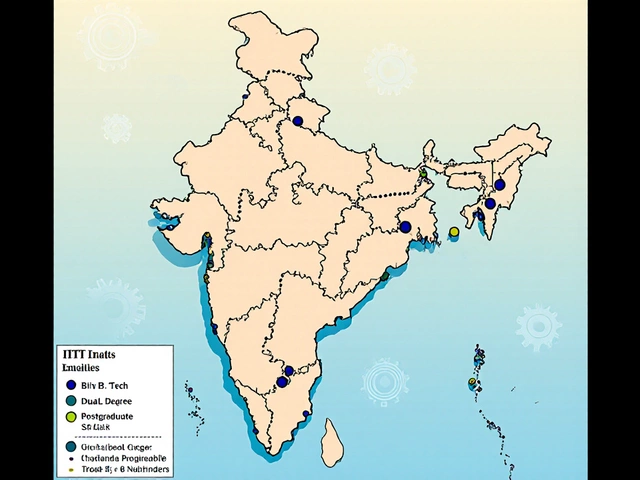If you’re sick of hearing that you need a four-year college degree to make decent money, you’re not alone. The truth is, plenty of high-paying jobs don’t require sitting in class for years or racking up a mountain of student debt. Instead, you can start working on real skills fast — and online courses are making it easier than ever.
Let’s get real: the internet changed almost everything about how we learn. You no longer need a fancy classroom; you just need a laptop and WiFi. Fields like tech support, digital marketing, web development, and even skilled trades can be learned through short, targeted courses. Unlike traditional school, you get straight to the stuff you actually use on the job.
What’s the paycheck look like if you skip the degree route? Jobs like IT support specialist, commercial driver, dental hygienist, and power plant operator can bring in anywhere from $50,000 to $90,000 a year—even higher if you niche down or add on certifications. The best part? Many of these courses take just a few weeks or months, not years.
- Why Skip Four-Year Degrees?
- Top High-Paying Jobs with Minimal Education
- How Online Courses Fast-Track Your Career
- Skills That Matter More Than a Diploma
- Realistic Earnings: The Actual Numbers
- Smart Tips for Jumping In
Why Skip Four-Year Degrees?
Let’s face it, college isn’t cheap or quick. According to the National Center for Education Statistics, the average total cost for a four-year degree in the US tops $103,000. That’s if you finish in four years—many people take longer and spend even more. And student debt? The Federal Reserve says the average student loan balance per borrower in 2024 is above $37,000.
The job market looks different now than it did twenty years ago. Tons of employers no longer care if you have a diploma; they want proof you can do the work. In fields like IT, health care, and skilled trades, the right certification or proven experience can get you hired just as fast (or faster) than a degree.
Here’s why ditching the four-year plan might actually be the smart move:
- Way less debt (or none at all)
- Ability to start earning in a year or less
- Quick adjustments—you can switch directions without wasting thousands
- In-demand skills that companies want right now
- Boosted job security in hands-on fields
Check out how the numbers stack up for recent grads versus people who jumped straight into trade jobs or short-term tech certifications:
| Path | Average Time to Start Earning | Average Starting Salary | Average Debt |
|---|---|---|---|
| Four-Year College Grad | 4-5 years | $55,260 | $37,000 |
| Trade/Cert Program | 6-24 months | $50,000+ | $0-8,000 |
We’re not saying a traditional degree is always wrong, but if your goal is a highest paying job with little schooling, the old college path just isn’t as efficient as it used to be. More and more people are skipping the long haul and cashing in faster.
Top High-Paying Jobs with Minimal Education
You don’t need a fancy degree to land a solid paycheck. A bunch of jobs out there pay really well, and they don’t ask for years in college—just the right kind of training or certification. Here are a few that stand out:
- IT Support Specialist: With just a handful of online courses, you can qualify for entry-level tech support gigs. According to Glassdoor, the average pay in the US for these roles is around $58,000 per year, and you can bump that up by tackling more complicated issues or picking up extra certifications (like CompTIA or Google IT Support).
- Commercial Truck Driver: Sure, you need a CDL (Commercial Driver’s License), but you can get that in a couple of months. Experienced truckers regularly bring in $60,000-$80,000 a year, especially if they’re open to long-haul routes.
- Web Developer: You don’t need a computer science degree to code websites. Plenty of people land web dev jobs after taking online bootcamps or self-paced coding courses. Average base salaries hover near $78,000 per year in the US, and freelancers can do even better if they pick up steady clients.
- Dental Hygienist: This job does require an associate degree, but that’s only two years, not four. The real kicker? Hygienists often earn $76,000 to $85,000, especially in busy urban clinics or private offices.
- Power Plant Operator: Not the most glamorous-sounding gig, but it’s stable and pays well. You’ll need to pass some technical tests and on-the-job training. Median pay is about $85,000 per year, all without a bachelor’s degree.
Notice the common thread? These jobs focus on skills—what you can actually do, not how long you sat in a lecture. Most hire based on certifications, practical tests, or a simple demo of your work, not a diploma. If you’re looking for the highest paying jobs without massive schooling, these are some of the best bets in 2025.
How Online Courses Fast-Track Your Career
Online courses have totally changed the game if you’re looking to land a highest paying job with little schooling. No need to jump through college hoops or wait years to start earning a real income. Instead, you get focused, up-to-date info that’s all about doing the work, not just memorizing facts for a test.
Take platforms like Coursera, Udemy, and Google Career Certificates. These are built by folks actually working in the industries, so you’re learning what employers want, not outdated theories. For example, the Google IT Support certificate gives you skills for entry-level tech support in under six months—and more than 75% of graduates score a job offer within six months of completing the program.
Here’s where online courses really speed things up:
- Short and practical: Many programs take just a few weeks or months—and are packed with job-specific training.
- Lower cost: You don’t need a loan for $50k. Most courses cost less than $1,000, some even under $100.
- Flexible schedules: You can study in the evenings or weekends, perfect for people who need to work right away or have family duties.
- Certifications that matter: Employers trust certificates from big names like AWS, Microsoft, Google, CompTIA, and Meta, especially for tech and business jobs.
And it’s not just tech. Commercial driving, bookkeeping, electrical work, and health support courses exist online too. You learn the basics, train for licensing exams, and get pointers for salary negotiation or resume-building. It’s all baked into a package you can finish before your motivation runs dry.
| Course Name | Field | Length | Average Cost | Typical Salary After |
|---|---|---|---|---|
| Google IT Support | Tech Support | 3-6 months | $39/month | $55,000/yr |
| Coursera Data Analytics Professional | Data Analytics | 6 months | $49/month | $65,000/yr |
| Udemy Digital Marketing Bootcamp | Marketing | 4-8 weeks | $100 | $50,000+/yr |
| AWS Certified Cloud Practitioner | Cloud Computing | 2 months | $150 | $75,000/yr |
Bottom line? Online courses skip the fluff and get you into the workforce—fast. No waiting, no unnecessary classes, just the tools you need to get hired and move up.

Skills That Matter More Than a Diploma
If you’re aiming for the highest paying jobs with little schooling, hiring managers care way more about what you can actually do than what’s printed on a piece of paper. Let’s break down the skills employers want, and why they lead to bigger paychecks—sometimes even faster than someone with a degree.
Tech jobs, trades, and even remote customer support gigs have one thing in common: they need people who can solve problems. If you nail these practical skills, you’re way ahead of the competition:
- Technical Know-How: For IT support, digital marketing, or coding, hands-on skills beat fancy vocab every time. That means troubleshooting software, building websites, or analyzing online ad data.
- Communication: Can you explain things simply over chat, email, or video? This is huge in jobs like tech support, sales, and even remote healthcare roles.
- Attention to Detail: Safe driving, dental hygiene, and jobs like power plant operator count on you catching tiny mistakes before they turn into big problems.
- Adaptability: Tech and online services shift fast. Getting comfortable with quick changes and new tools keeps you hired and ahead.
Real talk: online courses are packed with hands-on projects that mimic real-world tasks. Plenty offer certificates that hiring managers recognize, especially in fields like Google IT Support or Facebook Digital Marketing, where completion rates have tracked high job offers.
| Skill | Most Relevant Job Fields | Demand by Employers (%) |
|---|---|---|
| Tech Know-How | IT, Web Development, Skilled Trades | 85% |
| Communication | Remote Support, Sales, Healthcare Admin | 78% |
| Attention to Detail | Commercial Driving, Dental Hygiene, Power Plant Operations | 81% |
| Adaptability | Digital Marketing, Tech Support, Logistics | 74% |
If you’re wondering where to start, look for online courses that teach with case studies, real projects, or interactive tasks. Most ask for nothing more than a willingness to learn and a bit of grit. No four-year degree? Doesn’t matter if you can nail these must-have skills.
Realistic Earnings: The Actual Numbers
Let’s cut to the chase. How much money are we talking about if you’re not going to spend years in college? Lots of these high-demand roles are pulling in paychecks that would surprise you—and you don’t need a fancy degree for them. You just need the right skills, which you can usually pick up through online courses.
Here are some real numbers for jobs that need a certificate, license, or an associate degree instead of a long, expensive college stay:
| Job Title | Typical Schooling | Median Salary (U.S., 2024) |
|---|---|---|
| Web Developer | Online course/certificate | $78,580 |
| IT Support Specialist | Online certificate | $59,660 |
| Commercial Driver (CDL) | 4-8 week course | $60,320 |
| Dental Hygienist | Associate degree | $81,400 |
| Power Plant Operator | On-the-job training | $84,800 |
| Electrician | Apprenticeship/online classes | $60,240 |
| Digital Marketing Specialist | Online course/certificate | $67,330 |
The sweet spot here: a lot of these jobs offer growth if you build on your core skills. If you start as an IT support specialist and tack on a few technical certifications over the next year, you could see your pay jump by $10k or more. And if you go into web development or digital marketing, your portfolio will matter way more than a diploma. That’s where highest paying jobs meet real flexibility.
Another upside? Some companies also offer bonuses, overtime, or commission structures, especially in sales or specialized trades. So, your top-end earnings can look even better than those median numbers if you learn fast and play your cards right.
Smart Tips for Jumping In
When you're fired up to land one of the highest paying jobs with minimal schooling, you don’t want to waste time floundering around. Here are straight-up, practical tips to keep you on track from day one:
- Pick skills, not titles: Employers care about what you can do, not just what your resume says. Choose a path where your skills—technical or hands-on—show up clearly in your work.
- Research course quality: Not every online course is worth your money or time. Look for programs with current reviews, real-world assignments, and certifications recognized by employers.
- Get certified: Tech fields like IT, project management, or cybersecurity value certifications like CompTIA A+, Google IT Support, or AWS Cloud Practitioner. Even trades have short-term certs that impress employers.
- Build a portfolio fast: Whether it’s copies of digital work, coding projects, or completion certificates, showing proof matters more than talking about it.
- Network online: Use LinkedIn, Reddit industry threads, or groups for your field. A few direct messages can open doors to contract gigs or entry-level roles.
If you still feel unsure, check out what Ryan Craig, a higher education advisor, said recently:
"The fastest growing, best paying careers increasingly require skills training rather than degrees. Don’t wait four years to start earning."
Timing matters, too. Recent stats from the U.S. Bureau of Labor Statistics show that jobs like commercial drivers and dental hygienists have a projected growth rate of 6-9% through 2032. Here’s a quick breakdown to compare options:
| Job Title | Median Salary (2024) | Typical Training Time |
|---|---|---|
| IT Support Specialist | $59,660 | 4-12 months |
| Dental Hygienist | $81,400 | 2 years |
| Commercial Driver (CDL) | $57,480 | 1-3 months |
| HVAC Technician | $57,420 | 6-12 months |
The trick is to focus on quick wins. Finish that online course, get the certificate, and start applying right away. Many people land interviews while still training, just because they’re hungry to learn and start working.










0 Comments